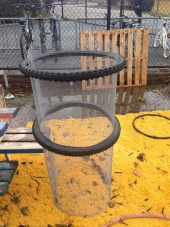




 1
1




Idle dreamer








 1
1




ev kuhn wrote:where does this piece of 'wisdom' come from, that raised beds are dry or dryer than level beds?
Idle dreamer




Casie Becker wrote:Yeah, unfortunately. We're in the limestone caliche area of the hill country (actually half a mile from a limestone quarry). Blueberries have to be raised above the level of groundwater flows or the alkalinity will kill them.

Idle dreamer
 1
1




 1
1








 (Actually I have found most gardening challenging here!
(Actually I have found most gardening challenging here!  )
)
Idle dreamer
 1
1




 2
2




















Twisted Tree Farm and Nursery
www.twisted-tree.net




With appropriate microbes, minerals and organic matter, there is no need for pesticides or herbicides.








With appropriate microbes, minerals and organic matter, there is no need for pesticides or herbicides.








With appropriate microbes, minerals and organic matter, there is no need for pesticides or herbicides.




ev kuhn wrote:
"...blueberries love accidic soils and blueberries love pine straw..."
What is pine straw please? Where do you find it? Do you mean pine needles found under any type of pine trees? TY.

|
And when my army is complete, I will rule the world! But, for now, I'm going to be happy with this tiny ad:
Learn Permaculture through a little hard work
https://wheaton-labs.com/bootcamp
|
